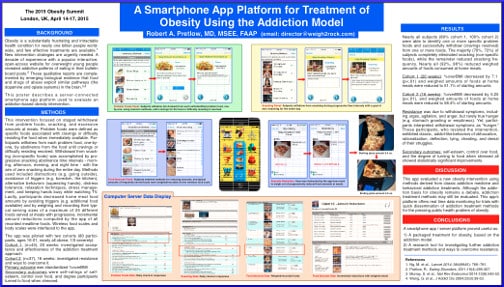Childhood Obesity News has been looking back at Dr. Pretlow’s presentations at various conferences throughout the years.
Let’s resume with 2011, when “Addiction to Highly Pleasurable Food as a Cause of the Childhood Obesity Epidemic” was the topic at the 2011 International Conference on Childhood Obesity in Lisbon, Portugal.
In May of the same year, Dr. Pretlow spoke at the 18th European Congress on Obesity (EOC) in Istanbul. He talked about the process of becoming hooked and the ordeal of tolerance mode, when no amount of the substance or behavior is sufficient to fill up the inner void. As a result he was invited to return the following year, with all expenses paid, to the 19th ECO, held this time in Lyon, France. He spoke on the topic of “Social Networking and Obesity,” and told the group about how the W8 Loss 2 Go smartphone application can help.
In 2013, there was the European Congress on Obesity in Liverpool, UK. “Compulsive Eating/Addiction Intervention for Obesity Implemented as a Smartphone App: A Pilot Study” is available online,as is the keynote speech from the 2014 European Childhood Obesity Group Congress in Salzburg, “Treatment of Child/Adolescent Obesity Using the Addiction Model.” Childhood Obesity News also included a post about that event.
Dr. Pretlow just got back from the Obesity Summit in London, at which he had been invited to give a talk, “Obesity Treatment Using the Addiction Model” which now anyone can hear. The visual part of the presentation has a new look. The Q & A session (Slide #37) is particularly interesting. We also recommend the new, improved poster–the academic version of an infographic, which includes a mass of essential information in easily assimilated form. (Shown in miniature at the top of this page.) The main idea here is that what we call “food addiction” is really overeating addiction, which is a behavioral addiction.
In the presentation, Dr. Pretlow outlines the willpower “vicious cycle,” in which resistance to food cravings is stressful, so the person copes with stress by overeating, and then suffers more anxiety because of guilt and failure. He tells how, in a survey of 479 adults in the U.S. and Australia, half the respondents favored treating obesity as a type of addiction. Even if people do not agree that obesity results from overeating addiction, the methods proven in addiction treatment can still work. He explains the various features of the W8Loss2Go smartphone application and goes over the results of the pilot studies. At the finish, the pilot study participants were asked, “Did it get easier to eat less food over time?” 84.8 percent said yes.
Dr. Pretlow described this latest professional gathering as…
…probably the best conference I’ve attended in terms of networking. There was a lot of interest in our addiction treatment approach.
Your responses and feedback are welcome!
2015 poster


 FAQs and Media Requests:
FAQs and Media Requests: 











